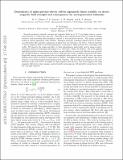Dependence of alpha-particle-driven Alfvén eigenmode linear stability on device magnetic field strength and consequences for next-generation tokamaks
Author(s)
Tolman, Elizabeth Ann; Gomes Loureiro, Nuno F; Rodrigues, P.; Hughes, J.W.; Marmar, Earl S.
DownloadAccepted version (1.465Mb)
Open Access Policy
Open Access Policy
Creative Commons Attribution-Noncommercial-Share Alike
Terms of use
Metadata
Show full item recordAbstract
Recently-proposed tokamak concepts use magnetic fields up to 12 T, far higher than in conventional devices, to reduce size and cost. Theoretical and computational study of trends in plasma behavior with increasing field strength is critical to such proposed devices. This paper considers trends in Alfvén eigenmode (AE) stability. Energetic particles, including alphas from deuterium-tritium fusion, can destabilize AEs, possibly causing loss of alpha heat and damage to the device. AEs are sensitive to device magnetic field via the field dependence of resonances, alpha particle beta, and alpha orbit width. We describe the origin and effect of these dependences analytically and by using recently-developed numerical techniques (Rodrigues et al 2015 Nucl. Fusion 55 083003). The work suggests high-field machines where fusion-born alphas are sub-Alfvénic or nearly sub-Alfvénic may partially cut off AE resonances, reducing growth rates of AEs and the energy of alphas interacting with them. High-field burning plasma regimes have non-negligible alpha particle beta and AE drive, but faster slowing down time, provided by high electron density, and higher field strength reduces this drive relative to low-field machines with similar power densities. The toroidal mode number of the most unstable modes will tend to be higher in high magnetic field devices. The work suggests that high magnetic field devices have unique, and potentially advantageous, AE instability properties at both low and high densities. © 2019 IAEA, Vienna.
Date issued
2019-03Department
Massachusetts Institute of Technology. Plasma Science and Fusion CenterJournal
Nuclear fusion
Publisher
IOP Publishing
Citation
Tolman, E.A., et al., "Dependence of alpha-particle-driven Alfvén eigenmode linear stability on device magnetic field strength and consequences for next-generation tokamaks." Nuclear fusion 59 (2019): no. 046020, doi: 10.1088/1741-4326/ab058f ©2019 Author(s)
Version: Author's final manuscript
ISSN
1741-4326
0029-5515